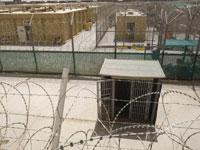One person who has spent a lot of time thinking about how the media covers kidnapped journalists is Micah Garen. In 2004, Garen was in Iraq wrapping up a documentary, when two days before he was scheduled to return, he and his translator were unlucky enough to catch the attention of a local group of Shiite terrorists.
MICAH GAREN: He and I were kidnapped out of a marketplace in Nasiriya, and they released two videos. One was an execution threat video. Then finally I was released unharmed after ten days.
BOB GARFIELD: Did they ever understand that you’re a journalist and that there would be publicity hay to be made there?
MICAH GAREN: From the start, our intention was to get it across to them that we were journalists. I think after a couple of days they finally believed it because they looked very closely at what was happening in the media. And we heard from one of the guards that they actually watch the media and see who talks about you, and if it’s friends and family, they said that, well, we realize that you’re a journalist. If it’s the military, then we think something else. But that still didn't stop the progression of events. It was five days into my kidnapping when I thought things were going well, but they made an execution threat video.
BOB GARFIELD: That wasn't necessarily an idle threat, because you were the first American journalist kidnapped since the abduction and murder of Daniel Pearl in Pakistan.
MICAH GAREN: Yeah, it was a time in Iraq where kidnappings started happening more and more frequently. I knew about the risks. You just never think it’s actually going to happen to you. I thought, in captivity, you know, during the whole time, that it was about 50/50, and from what we could understand from the kidnappers, through my interpreter who spoke to them as much as possible, there were two brothers arguing about our fate. And, as he said, one felt one way and one felt another.
BOB GARFIELD: Ultimately, they let you go. And you get back home to discover what had happened in the press. How had your abduction been reported?
MICAH GAREN: Well, the coverage while I was in captivity had escalated very quickly, and once the video execution threat was released, it became almost 24-hour coverage. News crews camped outside my family’s homes. You know, it was just something my family actually had to deal with intensely as part of the process of trying to get me free.
BOB GARFIELD: So, you weren't the beneficiary of the kind of widespread news blackout that David Rohde had the advantage of. Do you think that you were victimized? I mean, you got the mere stringer treatment while a full time New York Times reporter gets the full-on blackout.
MICAH GAREN: I mean, I think that it was quite clear that there was no blanket effort on all the media to suppress the story in my case and in other cases following. It really depends on the circumstances. One thing that was very surprising to me was when I was released I was flown out of Baghdad to Amman, and I was sitting next to an NBC reporter, and she said, thank God you made it out safely, we were really worried when four of our journalists were kidnapped in Fallujah three months ago. And that was a story I hadn't heard before and was not reported in the media. It had been successfully kept quiet until their release was negotiated about three days later.
BOB GARFIELD: I mean, it’s certainly understandable to want to protect one of your own.
MICAH GAREN: Yeah.
BOB GARFIELD: And it’s also equally understandable that the certain knowledge that publicity for a kidnapping is exactly what the captors crave because it gives them a platform. At the same time, as a journalist, do you think there’s ever a time when news should be suppressed?
MICAH GAREN: I think news is suppressed constantly. I think it’s editors’ decisions on what to print and what not to print. And I think a kidnapping is just another example of that. But I think people have to keep evolving their thinking about what is appropriate and what isn't appropriate in a kidnapping situation, and I would certainly err on the side of what’s in the best interest of the hostage.
BOB GARFIELD: All right, Micah, thank you very much.
MICAH GAREN: Thank you.
BOB GARFIELD: Micah Garen is a writer, filmmaker and founder of Four Corners Media.
[MUSIC UP AND UNDER]

